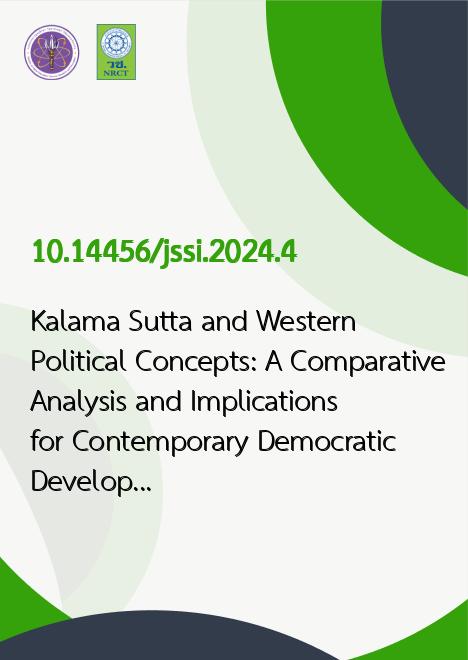
|
Kalama Sutta and Western Political Concepts: A Comparative Analysis and Implications for Contemporary Democratic Development |
|---|---|
| รหัสดีโอไอ | |
| Creator | Pongpunt Wongnongteoi |
| Title | Kalama Sutta and Western Political Concepts: A Comparative Analysis and Implications for Contemporary Democratic Development |
| Contributor | Sukit Chaimusik |
| Publisher | DR.KET INSTITUTE OF ACADEMIC DEVELOPMENT AND PROMOTION |
| Publication Year | 2567 |
| Journal Title | Journal of Social Sciences Innovations |
| Journal Vol. | 1 |
| Journal No. | 1 |
| Page no. | 56-73 |
| Keyword | Kalama Sutta, Western Political Science, Liberalism, UtilitarianismRationalism, Democracy |
| URL Website | https://so13.tci-thaijo.org/index.php/jssi/about |
| Website title | https://so13.tci-thaijo.org/index.php/jssi/about |
| ISSN | 3057-0948 |
| Abstract | The Kalama Sutta is a significant teaching in Buddhism that promotes the use of critical thinking and wisdom in examining truth, without blindly adhering to beliefs or authorities without reflection. Although the Kalama Sutta originated over 2,500 years ago, its principles remain relevant and applicable to contemporary political and social contexts. This academic article aims to analyze the connections between the principles of the Kalama Sutta and key Western political science concepts, demonstrating the contributions of Eastern wisdom to the development of modern politics and governance.This study presents a comparative analysis between the Kalama Sutta and important Western political science concepts, including liberalism, utilitarianism, Enlightenment rationalism, and democracy. The analysis reveals correlations between the principles of the Kalama Sutta and these concepts, particularly in terms of emphasizing individual freedom and equality, focusing on empirical outcomes, employing reason and empirical study, and developing public critical thinking as a fundamental basis for democracy. This article proposes that the Kalama Sutta has significant contributions to offer contemporary political science studies. It can be applied to develop critical thinking and wisdom in analyzing political phenomena comprehensively and profoundly, leading to enhanced political understanding and quality analysis. This, in turn, forms an essential foundation for the development of democracy and good governance in society. |
